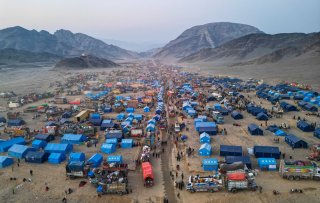Pakistan’s Mass Deportation of Afghans Fuels Instability
The expulsion of immigrants might make the country even less secure.
For many decades, Pakistan was generous toward Afghan refugees, taking in those who fled the country’s civil wars, the 1979 Soviet invasion, the U.S. incursion in 2001, and the Taliban takeover in 2021.
My brother and I were among those who fled our Afghan homeland to Pakistan after the Soviet occupation. Pakistani people warmly welcomed us. We were considered “golden refugees,” a term given to those fleeing communist regimes. I was fortunate to have my refugee status approved, which allowed me to move to the United States.
Today, however, Pakistan is flooded with 3 million Afghan refugees, and their lives are in peril. As of November 1, Pakistan began a mass deportation of illegal immigrants. To date, roughly 400,000 Afghans have been banished, and more than a million others face a similar fate.
The refugees find themselves with no good options. In an interview with Al Jazeera, an Afghan woman said she would rather die in Pakistan than return to Afghanistan. In a November 13 Foreign Policy magazine article, Lynne O’Donnell notes that those who fled Afghanistan to escape from decades of war and terrorism have become the unwitting pawns in a cruel political tussle between Pakistan’s government and the extremist Taliban. Their once-close relationship has disintegrated amid mutual recrimination.
Pakistan alleges the Taliban provides shelter to the Tehrik-E Taliban Pakistan (TTP) militant group. In the first half of 2023, militant attacks throughout Pakistan surged by 80 percent, according to the Pakistan Institute for Conflict and Security Studies, with the Pakistani Taliban suspected of being behind most of them. The Taliban, not surprisingly, deny the allegations.
Among those facing deportation are former Afghan soldiers, human rights activists, and women who fear that returning to Afghanistan means certain death. The Taliban promised amnesty for those who worked for the former government, then proceeded to commit “extrajudicial executions, arbitrary arrests, torture, and the unlawful detention of perceived opponents with impunity,” according to Amnesty International.
Pakistan has overlooked one important fact: most of the forced returnees are from Pashtun ethnic groups that comprise the Afghan Taliban. The expulsion of Afghan refugees could embolden the Afghan Taliban’s support for their ethnic brethren and provide fertile ground for recruitment.
The anti-Pakistan stance among the Taliban could reinforce their image at home as a nationalist group, countering allegations that they are proxies of Pakistan.
Afghan refugees should not be held responsible for the flawed policies implemented by the Pakistani security establishment. Over the past forty years, the international community repeatedly cautioned Pakistan to halt its support for Muslim extremists, as it was predicted they could eventually turn against them.
Those warnings went unheeded. During the twenty-year U.S.-led war in Afghanistan, Pakistan’s leadership was frequently accused of harboring or tolerating Afghan Taliban leaders and fighters. It now appears to be on the receiving end of a similar situation. For the past two decades, the TTP has fought alongside the Afghan Taliban against the United States and NATO forces in Afghanistan.
Many Afghans believe Pakistan accepted Afghan refugees for its own political and economic interests, particularly in terms of dollars and the war economy. Now, with the cessation of the war in Afghanistan and the subsequent decline in financial support from U.S. adversaries aimed at expelling the United States from the region, Pakistan no longer sees any need to host Afghan refugees. Nor does the Pakistani security establishment need to recruit poor Afghan refugees to send them to Afghanistan to fight alongside the Taliban, as they did in the past.
Sadly, the Pakistani government’s decision to deport Afghan refugees is fueling anti-Pakistani sentiment. This move risks creating a refuge for the TTP within Afghanistan, reminiscent of the hospitality extended to Afghans in Pakistan during Russia’s invasion of Afghanistan. To counter the threat of extremism, Pakistan could leverage its soft power to build genuine economic ties with the Afghan population. Resorting to collective punishment by deporting refugees is not the solution.
Wahab Raofi is a graduate of Kabul Law School and worked at various levels for the Ministry of Justice in his native Afghanistan. He immigrated to the United States, has a home in California, and worked with the NATO/International Security Assistance Force as an interpreter in Afghanistan. His articles have been published in major U.S. newspapers and media outlets worldwide, including The Washington Times, Christian Science Monitor, San Francisco Examiner, The Huffington Post, San Diego Union-Tribune, Stars and Stripes, Global Post, the National Interest, and the Orange County Register.
Image: Shutterstock.com.

